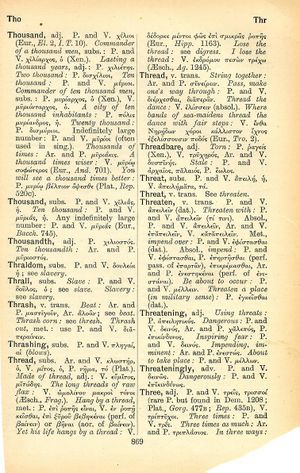thousand: Difference between revisions
νύμφην τ' ἄνυμφον παρθένον τ' ἀπάρθενον → wife unwed and virgin that is no virgin | bride that is no bride, virgin that is virgin no more | virgin wife and widowed maid | unwed bride and ravished virgin
(CSV5) |
m (Text replacement - "<b class="b2">Bacch.</b>" to "''Bacch.''") |
||
| Line 32: | Line 32: | ||
<b class="b2">Ten thousand</b>: P. and V. [[μυριάς]], ἡ. | <b class="b2">Ten thousand</b>: P. and V. [[μυριάς]], ἡ. | ||
<b class="b2">Any indefinitely large number</b>: P. and V. [[μυριάς]] (Eur., | <b class="b2">Any indefinitely large number</b>: P. and V. [[μυριάς]] (Eur., ''Bacch.'' 745). | ||
}} | }} | ||
Revision as of 09:48, 7 August 2017
English > Greek (Woodhouse)
adj.
P. and V. χίλιοι (Eur., El. 2, I. T. 10).
Commander of a thousand men, subs.: P. and V. χιλίαρχος, ὁ (Xen.).
Lasting a thousand years, adj.: P. χιλιέτης.
Two thousand: P. δισχίλιοι,
Ten thousand: P. and V. μύριοι.
Commander of ten thousand men, subs.: P. μυρίαρχος, ὁ (Xen.), V. μυριόνταρχος, ὁ.
A city of ten thousand inhabitants: P. πόλις μυρίανδρος, ἡ.
Twenty thousand: P. δισμύριοι.
Indefinitely large number: P. and V. μυρίοι (often used in sing.).
Thousands of times: Ar. and P. μυριάκις.
A thousand times wiser: V. μυρίῳ σοφώτερος (Eur., And. 701).
You will see a thousand times better: P. μυρίῳ βέλτιον ὄψεσθε (Plat., Rep. 520C).
subs.
P. and V. χιλιάς, ἡ.
Ten thousand: P. and V. μυριάς, ἡ.
Any indefinitely large number: P. and V. μυριάς (Eur., Bacch. 745).

